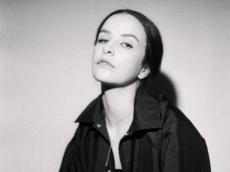「誰かに言われたからって、それをする必要もやめる必要もない。あなたはなんでもできる」Interview with Ela Minus about “acts of rebellion”
NeoL / 2021年1月15日 17時0分
エラ・マイナスことガブリエル・ヒメノは、ニューヨークのブルックリンを拠点とするエレクトロニック・アーティスト。生まれ育った南米コロンビアのボゴタで10代の頃からハードコア・パンク・バンドのドラマーとして活動し、渡米後、20代で名門バークリー音楽大学に進学してジャズ・ドラムとシンセサイザー・デザインを学んだという異色の経歴をもつ。昨年、〈Domino〉からリリースされたデビュー・アルバム『acts of rebellion』は、彼女のルーツであるDIYパンクのマナーと、クラブ・カルチャーに対する情熱が芸術的/理論的な帰結を見せた一枚。そして、プロテストのメッセージが散りばめられたダンス・パンク・アルバムだ。「静かにしている理由が見つからない/時間がなくなってしまうのが怖い/権利のために立ち上がるために(We can't seem to find/ A reason to stay quiet/ We're afraid we'll run out of time/ To stand up for our rights)」(“Megapunk”)。DJパイソンやブッテクノらアンダーグラウンド・シーンとの交流を通じて磨かれた才能の源泉、そして根底に脈打つ“反抗の精神”について訊いた。(→ in English)
――デビュー・アルバムの『acts of rebellion』を聴かせていただいて、エラ・マイナスというアーティストはどのようにして生まれ、またアーティスト活動を通じて今の世界をどのように見ているのか、知りたくなりました。なので今回のインタヴューでは、アルバムの話はもちろん、ルーツやバックボーンに関する話も伺えればと考えています。
Ela Minus「じゃあ、まずは説明するね。音楽に触れたのは、9歳の時に始めたピアノが最初だった。その後すぐにドラムに移って、10代の時はパンク・バンドをやってた。それからアメリカのバークリー音楽学校に入学して本格的にドラムとジャズを勉強した。エレクトロを聴き始めて、クラブに行き始めたのはその頃。それでシンセサイザーにすごく興味を持って、自分でプログラミングをしてシンセを作り始めたの。それでお金がもらえるようになって、ドラムをやりながらそういう仕事もしてた。だから、修理を頼まれたシンセが家にたくさんあって、それをいじり始めて今に至る、という感じ」
――パンク・バンド時代はどんな活動をされていたんですか。当時のことで印象に残っているエピソードがあれば教えてください。
Ela Minus「当時の私は今とは全然違ったと思う。バンドのメンバーは私以外みんな男の子だったけど、みんなすごく仲が良くて、ちょうど成長期だったし、バンドが学びの場だった。バンドの活動をする中で、自分よりも大きな存在に立ち向かうみたいな、そういうことも学べたし。10代っていう一番不安定な時期に、バンドが私の居場所だった。自分が何に向いているのか、模索する時期だから。特に、人と違う子にはそういう居場所が必要。私も人と違うティーンエイジャーだったから。ちなみに当時、すごく太ってたんだ。人気者タイプではなかったし」
――全然想像がつかないです。
Ela Minus「でしょ? 体型のせいで人気がなかったっていうのもあると思う。でも全く気にしてなかった。バンドのおかげで、私には音楽があるからって思えていたんだと思う。だからバンドには感謝してる。音楽を通してコミュニティに属することができて、自分の特別な居場所が見つかったから」
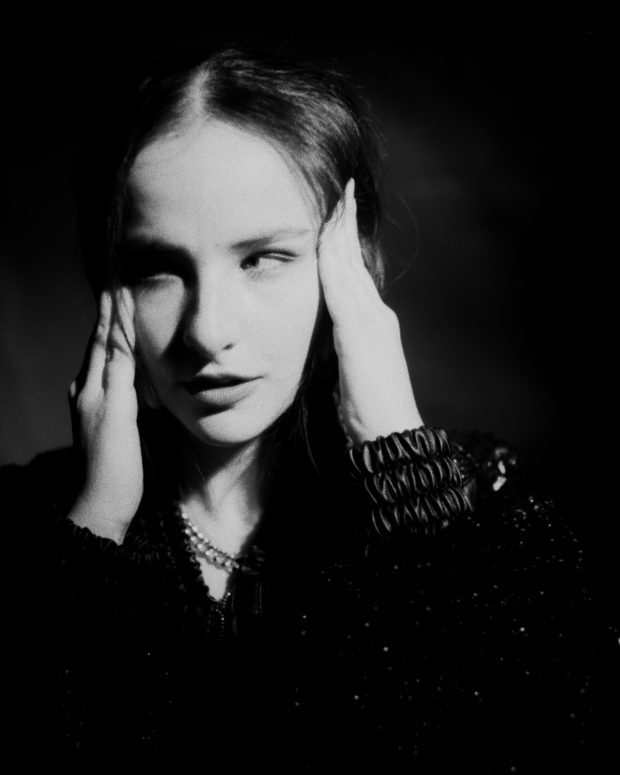
――バンドを始める前はピアノを弾いていたということですが、あなたがドラムを選んだ背景には、ピアノのレッスンを勧めたお母様への反発もあったと聞きました。パンク・バンド時代の経験は現在の活動にどのような影響、あるいは教訓を与えていますか。
Ela Minus「バンドでの経験は、全てが生かされてる。今はソロ・アーティストとしてひとりでプロジェクトを進めているけど、グループとして仕事をしていると思ってる。本当に好きな人とだけ仕事をしているから、私のプロジェクトに携わってくれる人たちには本当に感謝しているの。私の中には、パンク・スピリットが流れてる。DIY精神がすごくあって、自分がやりたいことは全部自分でやる。そして、一緒に仕事をする仲間は本当に信頼している人とだけ。今はレーベルに所属しているけど、それもレーベルの人たちが本当に良い人たちで、ファミリーだと思えるから。そういう考え方は、完全にバンドでの経験があったからこそだと思う。音楽に関しても、エレクトロのミュージシャンはコンピュータを使う人が多いけれど、自分で触って音が出る機材にこだわっているのもバンド由来ね」
――そのパンク・バンドで10年ほど活動した後、アメリカに渡ってバークリー音楽大学に進学されます。学校ではジャズ・ドラムとシンセサイザーのデザインを学ばれたそうですが、進学を決めた理由はなんだったのでしょうか。
Ela Minus「17歳ぐらいの時にバークリーを受けようと決めたんだけど、バンドのメンバーが全員バークリー志望だった。日本でも同じかもしれないけど、コロンビアでは、現代音楽で食べていきたい人が行きたい学校がバークリー。現代音楽を教えている学校が国内にはないから。少なくとも当時は、シンセサイザーとジャズを教えている学校はバークリーだけだった。あの頃の私にとってはバンドが人生の全てだったし、できればメンバー全員で進学したくて、特に深く考えず、『みんなで一緒に行こう!』って感じで。でも結局、合格したのは私ともう一人だけだったの。それが、バンドが解散したきっかけ。不合格だったメンバーとその人が喧嘩したりして、私は板挟みになってしまって。私としては、みんなで行けないなら別にバークリーなんか行かなくてもいいって、そういう気持ちだった。みんなで一緒に何かをすることが大事だったから。でも、最終的には入学を決めたのね。もちろん、後悔はしてない。素晴らしい経験が待っていたから。でも入学する前は、なにがなんでも行きたいという気持ちではなかった」
――へえ。でもそのバークリーでは、ハービー・ハンコックとの共演もあるドラマー、テリ・リン・キャリントンによる個人レッスンがとても大きな経験だったそうですね。
Ela Minus「もう、本当に全てが素晴らしかった。人生が変わる経験だった。技術的な面でいうと、ドラムでのメロディーの演奏の仕方を学んだ。ドラムで歌えるように、耳を鍛えた。どのジャンルにしても、楽曲のソウルを掴んで、メロディックな要素を表現できるようにね。ドラマーがメロディーを意識するっていうのは革命的な発見だった。でも自分で音楽を作るようになると、すごく理に適った考え方だということが分かった。彼女の理念だけじゃなくて、具体的なプレイの仕方自体がすごく納得できるものだったんだ。それを教えてもらえて、とても感謝してる。それに、彼女は素晴らしい人だから。すごく良い影響を与えてくれる存在。女性としても、私のロールモデルね」
――本当に大きな経験だったんですね。で、そうしてハードコア・パンクやジャズを経験した後、そこから現在の音楽スタイルのような方向性、いわゆるテクノやクラブ・ミュージック的なフィールドに進むようになったのは、どういう経緯があったのでしょうか。
Ela Minus「今の方向に進みたいと思ってそうしたというよりは、バンド音楽だったり、それまで自分がドラマーとして作っていた音楽のスタイルに飽きたというところが大きい。だから、最初はお楽しみのつもりでやり始めただけだった。自分の音楽に飽きちゃって、家にはシンセサイザーがあって、まあ、これを使って何か作れるかもなっていうぐらいで。それから、それまでは歌ったこともなかったから、それも実験してみようかなと思って。そうやって作った音楽に興味を持ってくれる人が現れて、ライブもできるようになるなんて、すごくラッキーだったと思う。ライブに関してはノーと言わないようにして、本当にたくさんのステージに立った。そうやって人前でパフォーマンスをする中で培ってきたものが、今の私のスタイルや今回のアルバムの音に直結してる」
――自然な流れでそうなったんですね。色々と試してみたくて。
Ela Minus「そう。新しいスタイルになってから何年か経って、それをひとつのアルバムとして発表したかった」
――では、改めてデビュー・アルバム『acts of rebellion』について伺わせてください。作品を聴かせていただいて、ダンスフロアの高揚感と、ベッドルームの静寂やアンビエントな時間とが隣り合わせで置かれたようなコントラスト、そしてあなたが語りかける言葉の強さ、臆さない力に心を奪われました。まずはサウンドについてですが、今作の音楽的なコンセプトやアイデアのもとになったものがあれば教えてください。
Ela Minus「そもそものアイデアは、『パンク・クラブ』だった。テクノ・クラブのパンク・バージョンで、汗臭くてガツガツしていて、コンパクトなイメージ。今回のアルバムをきっかけに私の音楽を聴いてくれる人はたぶん増えたと思うけれど、これまでは無名で、本当に小さいクラブに出演したりしていた。それがとても好きだったの。だから、私が愛する小さくて、こじんまりしたクラブをイメージしたアルバムを作りたかった」
――制作に際して、もっともチャレンジングだったこと、また新たにトライしたアプローチがありましたら教えてください。
Ela Minus「私にとっては全てがチャレンジングだったし、全てが新しかった(笑)。そもそもアルバムを作るのが初めてだから。それに、自分の部屋にこもって完全に一人で制作したんだけど、そういう風に音楽を作ったのも初めてだった。セルフプロデュースも初めてだし。EPを自分で作ったことはあったけど、3曲収録ですごく短いもので、それとは全然違うからね。技術的にも初めてのことづくしだったわ。でも楽しかったの。まさに“they told us it’s hard, but they were wrong(彼らは大変だと言ったが、それは間違いだった)”。大変だったけど、良い意味で大変だった。でも何でも、大切なことは簡単にいかないものだから」
――機材についてのこだわりもあれば教えて欲しいです。
Ela Minus「私は絶対にコンピュータは使わない。コンピュータとバンドは使わないのが私のスタイルで、シンセサイザーだけで制作する。基本で使っているのがmoogのMINITAURとSirin、それからRolandのJUNO-60の3つ。この3つがなかったら生きていけないぐらい大切」
――ライヴでもその3つを使うんですか?
Ela Minus「そう。これをレコーディングにも制作にもライブにも使う。すごくミニマルでしょ。そもそも機材はあまり持っていないから、持っているものを何にでも全て使うという感じ」
――セルフ・プロデュース、DIYなスタイルを貫いているあなたですが、最後の曲“close”ではゲストにエラード・ネグロが迎えられています。彼との共演はどのような経緯から実現したのでしょうか。
Ela Minus「もともと彼のファンで、ある時ニューヨークのライヴに行ったら夢みたいなことが起きて。彼がパフォーマンス中、曲と曲の間で『エラ・マイナスだね? 君の音楽が好きなんだ。聴きに来てくれてありがとう。楽しんで行ってね』って、ステージから私を見つけて声をかけてくれた。それをきっかけに友だちになって、彼のアルバム『This Is How You Smile』で歌ってほしいって言われて一緒に仕事をした。その時、私と彼の声の相性がいいことに気づいた。“close”は一晩で書き上げた曲なんだけど、彼とコラボができたらすごくいいものになるって思いついた。80年代っぽい、良い意味でダサい感じのデュエットにしたくて。だからその流れで彼に音源を送ったら、次の朝には返事が来て快諾してくれて『もちろん! 僕のスタジオに来て』っていう感じで。すごく自然な流れで、30分のワンテイクで完成したの。最高だった」
――すごいですね。運命だったんですね。
Ela Minus「そんな感じ。とっても自然で、すごく良い流れで実現したから」
――今回の制作にあたってインスパイアされたり、良い刺激をもらった音楽があったら教えてください。
Ela Minus「たくさんある。強く影響を受けているのはクラシックな音楽で、チェット・ベイカーとかマイルス・デイヴィスとかの往年のジャズ・ミュージシャンが多い。彼らみたいなすごくメロディックなものが好き。あとは最近の音楽でいうと、カリブー。今回のアルバムは、エモーショナルで、メロディックな音楽にインスパイアされてる。その3人が大きいかな。でもアルバムを作り始めた時に聴いていたのは、ダフト・パンクの1stアルバムの『Homework』とか、デンジャー・マウスとかだった。ジャンルは色々だけど、全部好き」
――ところで、今回のアルバムは実はほぼ2年前に録音されたものであると記事を読んで知り、驚きました。にも関わらず、ここであなたが発している問題定義や告発、怒り、あるいは他者に対する眼差しといったメッセージやステートメントは、むしろ2020年の現在においてこそアクチュアルに響いて感じられるところがあるように思います。ただし裏を返せば、それだけ世界や社会は何も変わっていない、いや、むしろ悪くなっている――という見方もできるかと思いますが、率直にどう感じていますか。例えば、この2年間が経過することで、書かれた当時と比べて曲のメッセージやステートメントのリアリティや重要性が増した、あるいは新たな意味が加えられたと自分で感じる曲はありますか。
Ela Minus「100%イエス。今言ってくれたことには完全に同意。もし2年前にリリースしていたら、違う作品になっていたと思う。ジョン・ケージが書いた本をよく読むんだけど、彼が『アーティストは作品が持つ意味の半分しか作ることができない。残りの半分は受け手が作る』というようなことを言っていて。今、その意味を心の底から理解してる。作品は受け手とコンテクストありきであって、受け手がどう感じるかが作品の意味を作ると思っている。私のアルバムは、奇しくもたくさんのコンテクストが生まれて、たくさんの意味を持つ時代に発表された。これ以上の好機はないと思う。意味のある時代にリリースができて良かった。私の中では、このアルバムを今年(2020年)出せたこと、それが唯一の成功よ」
――リリースを待っていたというわけではないんですよね?
Ela Minus「偶然だった。アルバムが完成したらすぐにリリースするっていう、普通の流れになるはずだったんだけど、色々な人から一緒に仕事がしたいってメールをもらったりした。私は普段、常にツアーをしているんだけど、その中で出会った色々な人たちから連絡が来て。もともと、誰かとコラボレーションすることには全然興味がなかったんだけどね。アルバム制作のために半年ぐらいツアーを休憩したんだけど、私が常にライブをやっているっていうのはみんな知っているから、制作をしているっていうのが自然と分かったみたいで。そんな中で、レーベルの人も私が制作しているっていうのを知って、興味を持ってくれて、関係者の人たちとミーティングをしたりもしてた。結局今のレーベルと契約をすることになったんだけど、大きなレーベルと契約するのはすごく時間がかかる。そんなこんなで、リリースできる状態になるまで2年かかったっていう流れ」
――“Megapunk”の「(あなたは理解したくない/あなたは私たちを引き離すことを選んでいる/それでもあなたは私たちを止めることはできない)You don’t want to understand/You’re choosing to lead us apart/But against all odds/You still won’t make us stop」というラインは、今も世界中の至る場所で起きている抗議や抵抗の運動をエンパワーメントするものですが、この曲はどこから生まれたのですか。
Ela Minus「“Megapunk”は、今回のアルバムの中で一番歌詞に時間をかけた曲。最初に書き始めた時は、女性が感じている抑圧についてのメッセージだった。私自身も女友だちも、男の人と付き合い始めると、彼に仕事を辞めるように言われるっていうことがあってね。この歌詞を書いた時も、ボーイフレンドから『仕事を辞めて。働きすぎ』って言われて、本当に頭にきてた。実際、その言葉で仕事を辞めて、主婦になった友だちも何人もいる。だからデモを作った段階では、この曲を女性のアンセムにするつもりだった。自分が好きでやっていることを辞める必要なんてない、女性だってステップアップしていくべきだっていうね」
――ええ。
Ela Minus「あとは、女性同士団結しようというメッセージも伝えたくて。女性同士が集まると、協力し合うんじゃなく争い合いがちだから。でも、そうやって歌詞を書いていくうちに、自分が手に入れるべきものを得るために闘っているのは、女性だけじゃないって気づいた。それで色々と手を加え始めたの。今引用してくれた部分の歌詞はまさに、政治について言及している部分。『気づいてないかもしれないけど、私たちが分断しているのはあなたのせいなんだ』ってね。どの国の政策もラディカルになってきていて、それが私たちを分断しているから。この曲ができたのはそういう流れ。もともとは女性のための曲にするつもりだったけど、途中から、立ち上がるための励ましが必要な全ての人に向けた曲に作り替えた」
――ということは、「(誰もがそれは難しいという/けれどそれは間違いだった/恋をするときは、すべてを愛して/不可能なことはない)Everyone told us it's hard, but they were wrong/When you love, you love it all, and nothing is impossible」と歌う“they told us it was hard, but they were wrong.”の「Everyone」、あるいは「they」は、「女性としてあるべき姿」を求めてくる人たちのことを指しているということでしょうか。
Ela Minus「そう。それに、音楽業界でも、『(女性アーティストなら)こういう方向性でいくべき』とか、『別の言語で歌うべき』とかっていう風に言ってくる人がいるから」
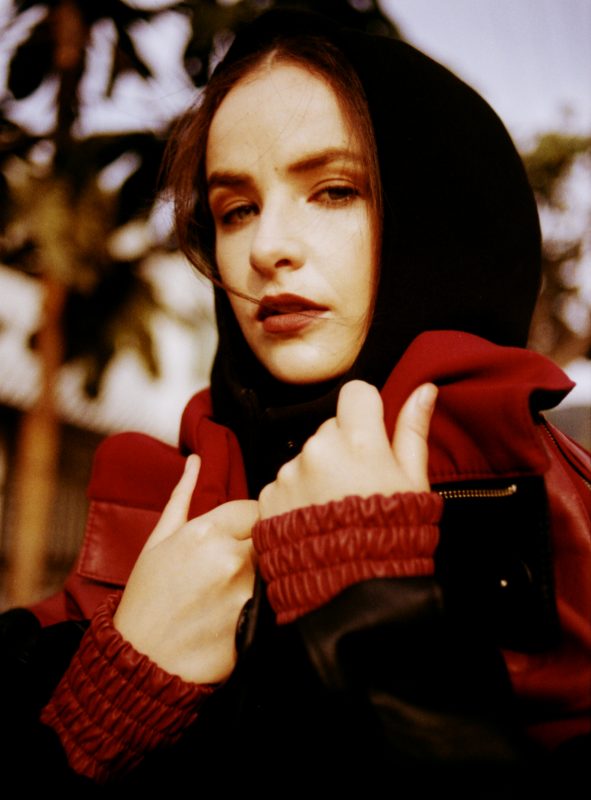
――あなたの音楽は“政治的”と言われることが少なくないと思います。ただし、あなたが呼びかける、抑圧に抵抗すること、自分を愛すること、自分で自分の道を切り開くことを信じること……といったステートメントは、どれも社会や世界に向けて広く発信されたものというより、あなたの音楽を聴いている個人に対して語りかけられたものであり、また、どの歌もあなたの個人的な体験から生まれてきたものであるという印象を抱かせます。そうしたあなたの曲から窺える物事の捉え方、理念や哲学みたいなものは、あなたの中のどこにルーツがあるのか、興味があります。
Ela Minus「そういう風に理解してくれて本当に嬉しい。作りたかったのは、パーソナルなアルバムだったから。このアルバムを政治的だと解釈する人がたくさんいて、驚いてるの。私としては、これ以上ないほどパーソナルなアルバムになったと思っていたから。リスナーに語りかけるような、そんな個人的な作品にね。制作が半分ぐらいまで進んだとき、1曲目のタイトルを“A Little Act of Rebellion”にしようと思った。パワフルだけど謙虚で、良いタイトルだと思って。でも、デモを通しで聴いて、自分が作ろうとしている作品について考えていたとき、私が人生の中でいつも険しい道を選んできたのは“act of rebelling=反逆行為”なんだって気づいた。それで、ちょっと恥ずかしくなった。これまで自分がやってきたことは全て、『あなたにはできない』って言ってきた人たちを見返すためのものだったんじゃないかって思えてきたから」
――はい。
Ela Minus「でも、音楽に対してはいつも正直でいたい。恥ずかしく思うんじゃなくて、これが私なんだと思っていたいって考え直して。闘いの姿勢を持ち続けて、目の前の物事を疑い続けなければ、自由は手に入らない。そうやって自分のために闘って、自由を手にできたら、幸せだから。自分のために尽力すれば、自分の身体も魂も、良い状態であり続ける。自分の存在、そして自分がこれまで歩いてきた道をちゃんと認識することができたら、より良い人間になれる。より良い人間になれれば、周りの人にも良い影響が与えられると思う。それが、私が音楽を通して伝えたいこと。このアルバムを通して、人生への新しい向き合い方を提示したかった。誰かに言われたからって、それをする必要なんてない。なんでもできる」
――なるほど。ということは、周りにいる人たちからインスピレーションを受けることが多いですか。
Ela Minus「影響はとても受けてる。面白いのが、このアルバムを作り始めた時は極力、自分自身についての作品にならないようにしようとしていたの。でも結局、私と周りの人たちそのものが現れたものになった。なんていうか、ある意味、私にインスピレーションを与えてくれた人たちについての音楽を作ろうとすると、彼らの中に見ている自分が現れる。鏡みたいなものね」
――最後に、アルバムを聴いたリスナーにメッセージをください。
Ela Minus「日本はずっと、行ってみたい国No.1。日本の文化にもインスピレーションをもらっているし、本当に行きたい。それがひとつ目。もうひとつは、自由になって、幸せになってと伝えたい。私の音楽を聴くことで少しでも自由な気持ちになって、強くなってもらえたら嬉しい。やりたいことなら、なんでもできるから」
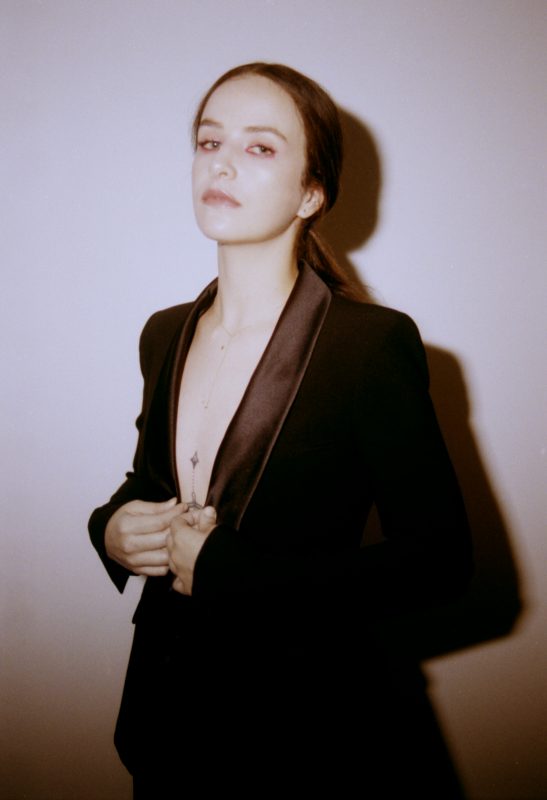
Photography Juan Ortiz-Arenas
text Junnosuke Amai
edit Ryoko Kuwahara
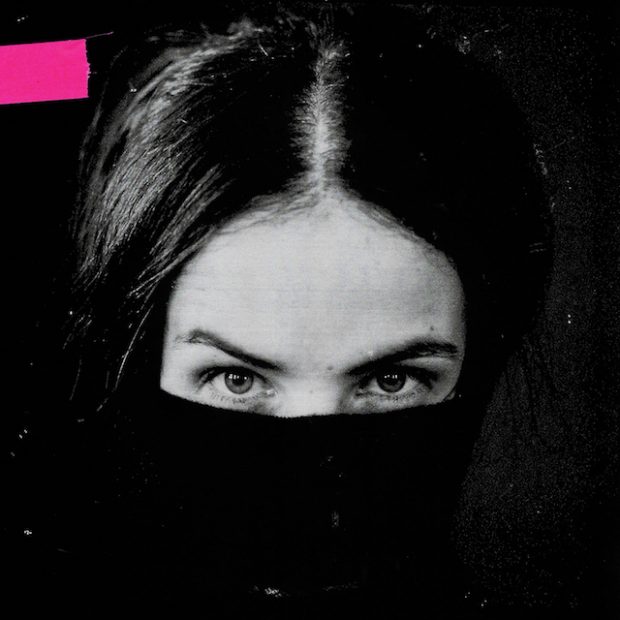
Ela Minus
『acts of rebellion』
発売中
(Domino)
http://www.beatink.com/products/detail.php?product_id=11374
tracklist:
1.N19 5NF
2. they told us it was hard, but they were wrong.
3. el cielo no es de nadie
4. megapunk
5. pocket piano
6. dominique
7. let them have the internet
8. tony
9. do whatever you want, all the time.
10. Close (ft. Helado Negro)
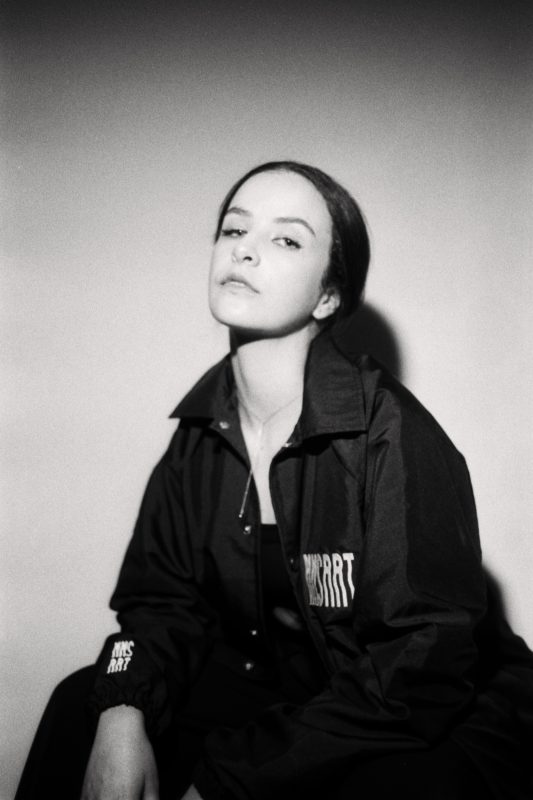
――This is your first album and congratulations on your new album, and I believe you have got a lot of new listeners since it’s released, so I would like to ask you about the album itself of course, but also I wanna hear about your background or how you started music.
Ela Minus : Okay, I started it from 9 years old with playing a piano and very quickly switched to drums. I had a punk band as a teenager and when I was growing up. I officially studied drums and jazz when I went to Berklee College of Music in the US. That is where I started listening to electronic music and going to clubs. I became very interested in synthesizers, so I programmed my own synthesizers. While being a drummer I made synthesizers for other people as well. I have so many old synthesizers in my house so I started using them in my projects.
――I see. I would like to ask you about being a drummer in your band. It was a surprise for me that you were a drummer of a hardcore band. Could you let me know how your life was in the band back then?
Ela Minus : I was very different when I was young. Other band members are all boys except me and we were all very close. The teenage years, especially between 11 and 18, you are constantly learning and reshaping your identity. Those years with the band were like my school and I learned about being part of something bigger than yourself. By spending time with the band, I felt that I belonged to something and my life had a meaning. Back then I was very different, I was chubby and not popular.
――I can’t imagine that, though.
Ela Minus : Teenagers are so insecure but having a band made me feel like it didn’t matter because I have a new thing. I am very grateful to have grown up having such a community where everybody knows each other. It is so special.

――So, you were playing the piano younger than you were in the band, and I read the article that the reason you started drumming was to go against your mother who wanted you to play the piano, but how’s the experience from the band living in your current musical approach?
Ela Minus : I think it’s everything. Even though it’s a solo project and I am a solo artist, I still think in a group. I care about the people that I work with, and I only work with people that I like a lot. I pretty much live that punk spirit. That DIY experience of doing whatever you want yourself. You only work with your friends because you love each other. Even though I am a big label now, I only sign with them because I really like them as people and belong to this family. Also the physicality of playing an instrument, touching and playing with your hands is very different from most artists that use computers. I think this comes from my past experience in a band.
――After being in the band for ten years, you started studying jazz drumming and synthesizer at Berklee College of Music. Which is amazing, but what made you decide to enter Berklee?
Ela Minus : I was about 17 when I decided to go to Berklee. Everyone in my band wanted to go there. In Colombia if you want to be a musician and study contemporary music, that was the place. There is no school that teaches contemporary music in Colombia. In that time it was the only school that taught jazz and synthesizers.
Since my whole life was about the band, everyone wanted to go together so I was like “sure!”. But then only two of us got accepted. That was the reason why the band broke up, because everybody got mad at each other. I didn’t mind not going if everyone wasn’t there but in the end I decided to go. Of course it was amazing and I was very glad.
――In Berklee, you were taught by the legendary drummer, Terri Lyne Carrington. What did you learn from her?
Ela Minus : I am so thankful. I really think that she changed my life. In a more technical aspect, I learned to play melodies with the drumset. I trained my ear to only follow the melodies, understand the soul of the song in every genre. I agree to her melodic aspect of the song and to think that way as a drummer it’s really revolutionary. You are so much more sensitive, and you are serving the music not yourself. She taught me not only the philosophy of it, but also how to do it. She is an incredible human being and very inspiring. Even as a female she is such a great role model. I’m very thankful.
――Based on that whole experience, you started techno music after that, that you are doing right now. How did you get to the current style of your music?
Ela Minus : I didn’t plan to make this. I was kind of bored of bands and the music I was making as a drummer. I started as a game for myself. I felt like I could make something with these machines. I had never sung before so that was also a good experiment. I was very lucky that people got interested. So I started playing a lot of live shows. I said yes to everything, and in these concerts with the audience, is how I developed the sound that is in the record.
――So, it just happened naturally. You wanted to try everything.
Ela Minus : Yes, over a couple of years. I think the record is the representation of those years.
――I would like to get into specific questions about your album, but first of all, did you have any concepts and ideas to create the sound for this album?
Ela Minus : I wanted to make a club album. In my mind it was a punk club. I wanted a techno club, with a punk aspect of a small, sweaty compact space. With the album I gained a low of followers and listeners but before I was playing in very small clubs. I loved that. I wanted to make a record for those clubs. Very small and intimate ones.
――Did you experience any challenging things or did you try anything new for this album?
Ela Minus : Yes. Everything about this album was a challenge. Everything I did was new. I have never made an album before and I made it completely alone in my apartment. I have never produced anything before. I had only worked on my own music by myself but it was very short, like EPs of three songs. It was completely different from an album. A lot of technical things were my first. I enjoyed it very much like the title of the song, “they told us it’s hard, but they were wrong”. It was very hard but in a nice way, just like how things that matter are harder to do.
――So, about the synthesizer you use, do you have a particular choice of the equipment you use for making music? If you have any specific synthesizer you love to use, I would like to know.
Ela Minus : First of all, never computers. Computers are banned in my musical existence. But specific synthesizers, like the moog MINITAUR which is a base synthesizer and the moog Sirin are the two that I need very much. Also the Roland JUNO-60. Those three are my favourite ones that I can’t live without.
――Do you use them for your live shows, too?
Ela Minus : Yes. I don’t have many synthesizers but those that I have I use them for everything. For recording, for writing and for my live shows. Very minimal.
――Most of the time your music is Do It Yourself style and you produce your music by yourself, but in this album, the last song is featured Helado Negro. How did that happen? How did you meet him?
Ela Minus : I’m a fan. I went to a show of his in New York. It was very surreal, he stopped between the songs and said “You’re Ela Minus I love your music! Thank you for coming to my show, please stay after I would love to talk to you.” So we met that way and became friends. He asked me to sing on his album couple of years ago in ‘This Is How You Smile’. We worked together on his album and I thought our voices sounded so beautiful together. When I wrote ‘Close’, I wrote it in one night. I woke up the next day and I thought it would sound beautiful as a duet. As a cheesy 80s duet. I immediately remembered his voice, and I asked him that day. We did it in 30 minutes, one take that day in his studio. I really like it.
――Wow. Maybe that was meant to be.
Ela Minus : I think it sounds like that. I think it sounds so natural, nice and sweet.
――Do you have any music or musicians you are inspired for making this album?
Ela Minus : My biggest inspiration have been a couple of jazz musicians like Chet Baker and Miles Davis. I am obsessed with melody. In a more contemporary world, I would say Caribou. They have such emotional music references. When I was making the record I was listening to Daft Punk’s first record called ‘Homework’, and John Maus. More electronic and indie music, I love it too.
――I was surprised that you recorded this album almost two years ago. But your message and your statement in this album is obviously something we can feel very real today, more than two years ago. Do you feel like your message in this album has got more real and more important than two years ago? And do you think any new meaning has added to your album within these two years?
Ela Minus : Yes 100%. I would agree with you. It would not have been the same if it was released two years ago. I read a lot about John Cage, he used to say that “The artist only gives 50% of the meaning, and the audience gives the other 50%” I never understood it as deeply as now. Both the audience and the context of art are more than half of the actual art. It is the viewer, and everything he or she is carrying that gives meaning. The fact that my record came in a moment that already has so much context, it is seen as real. I wouldn’t have wished it would come out any other time. It mattered this year and only for that is a success in my heart.
――You were not waiting to release it, right?
Ela Minus : It was a coincidence. I finished it and I was a week away before releasing it.Because I was touring so much, there had been so many people who wanted to work with me. I had never really paid attention to working with others, but for some reason a lot of interesting people wanted to know when I finished my album. In order to make the album I took six months and people noticed this. Labels started getting interested and I took meetings so it took a long time. I met people at my label, I love them and getting a big contract with a label took a long time.
――I’d like to ask you about “Megapunk” in this album, but I thought the lyrics “You don’t want to understand/You’re choosing to lead us apart/But against all odds/You still won’t make us stop” is an empowering statement which can encourage protests or demonstrations that are going on right now. How did you come up with this song?
Ela Minus : “Megapunk” was the song I worked on the most. When I first wrote it it was about female oppression. I have seen a lot of my female friends and I was in a relationship that was always demanding that I stopped working. My boyfriend would always tell me to stop working, and I was working too much. I was very mad when I wrote this song, and I had a couple of friends who quit their job to become housewives. It was clear in my mind that it was pressure. I wanted to write an anthem for women to step up, not stop and unite. A big problem with women is that we tend to compete between each other. I was thinking about it afterwards and I realised that women weren’t the only ones who needed to keep fighting for their needs. The sentence you quoted was very much inspired by politics. Politicians around the world tend to be radical right. A characteristic of being right is dividing people. So I was writing that it was a choice we were making that everyone is dividing us all the time. The initial idea was about female empowerment but it is about everyone who needs encouragement to stand up.
――There is also the lyric saying “Everyone told us it's hard, but they were wrong”. But the “Everyone” in that lyric means someone who forces you to do something or be something supposed to be as a woman?
Ela Minus : Yes exactly. Everyone in my life, including people in the music industry have told me that you can’t do this, you need to do something else, you need to sing in another language.

――I believe you get a certain amount of voices that say your music is political. But I think your message is more personal, because it feels like it’s something that came out from your personal experiences and something you are talking to your audiences, rather than a statement to society or the world. So I would like to know where your perspective or your principle, and your philosophy came from.
Ela Minus : First of all I love that you see it like that. That is exactly how I intended it to be. I’m very surprised that people understood the political element. For me it’s the most personal thing I could have done. I was speaking to my audience on a personal level. While I was making the record I realised that I had named one song “A Little Act of Rebellion”. I always liked the name of that song a lot. It felt powerful and also humble because of the “Little Act”. It is the first song of the record.
I remember one night I was listening to the demos and thinking about what I was making. I realised then that the act of rebelling and taking the harder route was what I was doing throughout my life. It was embarrassing because I started questioning if the real reason I was doing everything, was just because someone told me I couldn’t. It seems like a silly reason but I was trying to be honest and naked with my music. It’s not about me being ashamed of myself, this is who I am.
This is the record I have to make, it is so important that we define everything and question everything. That is the path to freedom, and when you are free you are happy because you did something good for yourself. I really think our souls, our bodies are good to us when we are good to them. By questioning and reimagining your life, you are happier and only then you are a nicer person to everyone. I just wanted to offer another way. Just because someone has told you one way doesn’t mean that is the way you should follow.
――When you make your music, do you get inspired by people surrounding you?
Ela Minus : I tried really hard to not make it about myself but also I realized with this album that it is myself that other people relate to. Even if I try to write about people I meet and get inspired by, the only thing other people see is when I am being honest about myself. It’s like mirror really.
――This is the last question, but could you give us your message for your listeners especially in Japan?
Ela Minus : Japan has always been my number country I want to go to. I am so inspired by your culture and I can’t wait to go. I want my listeners to be free and happy. I hope that when you listen to my music you feel invincible and it empowers you to do the things you want to do.

Photography Juan Ortiz-Arenas
text Junnosuke Amai
edit Ryoko Kuwahara
関連記事のまとめはこちら
https://www.neol.jp/music-2/
外部リンク
- 「私の日記であり、これからずっと残り続けていく記憶」Interview with Victoria Monét
- 「誰かに言われたからって、それをする必要もやめる必要もない。あなたはなんでもできる」Interview with Ela Minus about “acts of rebellion”
- Nozomi Nobody、下村亮介、小美濃悠太 、吉木諒祐によるコレクティブ「NIGHT PONDO」、美術家・今津景によ る1stシングルのアートワーク公開
- 「日頃から考えてますよ、『なぜゆえにラップをするのか』って」般若『その男、東京につき』インタビュー
- ブリアル、フォー・テット、トム・ヨークによるコラボレーション・シングル
この記事に関連するニュース
-
富士花鳥園:今年の連休は富士山麓で猛禽類などと触れ合ってみる Fuji Kachoen: A week to interact with owls and hawks near Mt. Fuji
PR TIMES / 2024年4月23日 10時15分
-
NAF Atsugi_ Military’s bungled response to PFAS spill worsened environmental impact, sickened sailors
沖縄タイムス+プラス / 2024年4月22日 17時0分
-
【東京グレートベアーズ】ラファエル・アラウージョ選手 退団のお知らせ
PR TIMES / 2024年4月11日 18時40分
-
日本ゼオン、偽造防止にもなる新素材を取り入れたアート作品を世界初披露
PR TIMES / 2024年4月4日 9時45分
-
芸能事業「UQプロダクション」を開始し、社長自らアーティストデビュー
PR TIMES / 2024年4月2日 12時15分
ランキング
-
1平均月23万円だが…〈初給与〉に心躍る大卒新入社員〈給与明細〉を見て愕然「天引き額が多すぎる!」
THE GOLD ONLINE(ゴールドオンライン) / 2024年4月25日 7時15分
-
2ビジネスシーンでの「方言」どう思う? 「標準語にすべき」「方言でも問題ない」意見真っ二つ! マナーコンサルタントの見解は
オトナンサー / 2024年4月25日 7時10分
-
3「健康食品は健康に悪い」という不都合な事実…紅麹サプリ問題で明確になった健康食品の恐ろしいリスク
プレジデントオンライン / 2024年4月25日 9時15分
-
4初期から老眼鏡をかけっぱなしにすると「老眼」が早く進む【一生見える目をつくる】
日刊ゲンダイ ヘルスケア / 2024年4月25日 9時26分
-
5究極の卵料理「ウフマヨ」が簡単に作れちゃう! 農水省がレシピを伝授
オトナンサー / 2024年4月24日 22時10分
記事ミッション中・・・
記事にリアクションする
![]()
記事ミッション中・・・
記事にリアクションする

エラーが発生しました
ページを再読み込みして
ください



